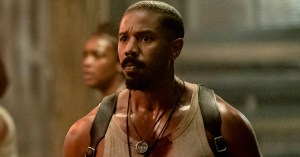Total Recall: Victory at Sea
With Battleship hitting theaters, we collect some memorable examples of cinematic naval triumphs.
Summer’s almost here, and you know what that means — from now until Labor Day, the Earth will be in near-constant danger of utter destruction every single weekend. At the box office, anyway. This week, we’re under attack from a crew of nasty aliens, and only Taylor Kitsch and Rihanna stand between us and certain doom. We’re talking about Battleship, of course, and all that aquatic derring-do got us thinking about other movies featuring thrilling peril, men and women of valor, and lots and lots of water. It’s time to celebrate some Victory at Sea — the Total Recall way!
The Battle of the River Plate
82%Copious amounts of CGI definitely helped Peter Berg make it look like aliens were invading Earth in Battleship, but it doesn’t take fancy computers to approximate the thundering chaos of naval warfare. Case in point: 1956’s Battle of the River Plate (released in the U.S. as Pursuit of the Graf Spee), which earned bonus points for realism after directors Michael Powell and Emeric Pressburger used actual American and British cruisers to relive the first naval battle of World War II. But more importantly, at least as far as most critics were concerned, the duo’s screenplay presented the war as a conflict between actual human beings rather than a cartoonish collision of good guys and bad guys. “Though it’s mostly a waiting game, the film is tense and involving, thanks to Powell’s fluid shifting of the point of view,” observed the Chicago Reader’s Dave Kehr. “You root for the Germans as much as for the Allies.”
The Bedford Incident
86%A sort of Moby Dick for the nuclear age, The Bedford Incident offers a poignant (and, at the time, rather terrifying) meditation on the cost of war. Sidney Poitier stars as a reporter who boards an American destroyer as part of a profile on its captain (Richard Widmark), only to find himself an unwilling participant in his increasingly dangerous pursuit of a Soviet submarine that has been detected nearby. With an amped-up ending that diverged from the Mark Rascovich novel that inspired it, Bedford offered something to enjoy even for critics like the New York Times’ Bosley Crowther, whose largely ambivalent review described the film as “a cinematic blooper” but admitted, “If you view it as straight, unchallenged fiction… you may find this austerely masculine picture of a maritime episode in the cold war a grimly absorbing speculation on how wrong one ship’s captain might be.”
The Caine Mutiny
95%Featuring a fine late-period performance from Humphrey Bogart and fleshed out by a solid cast that included Jose Ferrer, Van Johnson, and Fred MacMurray, 1954’s The Caine Mutiny adapted the Pulitzer-winning Herman Wouk novel that traced the deteriorating relationship between a hard-nosed Navy commander (Bogart) and his crew — some of whom suspect him of being genuinely mentally unfit to safely lead the ship. While it contains its fair share of naval warfare, Caine‘s most important battles are fought with low-key performances instead of torpedos; as Film4 put it, “The drama is compulsive and the starry cast make the most of a mountain of words.”
Das Boot
98%Das foregone conclusion for this list, yes? Wolfgang Petersen’s 1981 war epic is almost universally recognized as not only a classic naval drama, but one of the finer films of the 1980s as well as a towering classic of German cinema. Here in the States, Das Boot earned nearly $85 million (spread out over two theatrical runs spaced 16 years apart) and six Academy Award nominations — not bad for a World War II movie with zero American stars and long stretches without battle action. “It is unlike any other war film in that it confines the audience in a confined submarine where we digest the fear and panic of the human beings on screen,” enthused Cole Smithey. “In short, Das Boot is a religious experience.”
The Final Countdown
52%There have been any number of movies about Pearl Harbor, and quite a few films featuring modern-day nuclear wessels — but the only one that’s ever dared to combine the two of them is The Final Countdown, starring Kirk Douglas as the skipper of a supercarrier that somehow wanders through a time vortex and ends up traveling back in time from 1980 to 1941 — one day before the attack at Pearl Harbor. It’s an intriguingly silly premise, at the very least; sadly, audiences weren’t terribly interested in seeing how it all played out, and critics, for the most part, weren’t impressed. Calling the movie “utter nonsense,” Vincent Canby of the New York Times allowed, “In defense of Don Taylor, the director, I must say I don’t think there was any way in which he could have made sense out of the screenplay or could have directed the actors to speak this dialogue with conviction.”
The Hunt for Red October
88%Okay, so it’s technically more a film about the avoidance of naval warfare, but because we know we’ll get a bunch of “what about Hunt for Red October” comments if we leave it off the list, here’s the 1990 classic about a defecting Soviet submarine commander (Sean Connery) whose entry into U.S. waters puts the two nations on the brink of World War III, with only Jack Ryan (Alec Baldwin) standing between them. “The film is a piece of heightened prosaic suspense,” marveled Entertainment Weekly’s Owen Gleiberman. “It comes at you in big, chewy gobs of exposition and dialogue.”
Master and Commander: The Far Side of the World
85%Nominated for an impressive 10 Academy Awards, Peter Weir’s Master and Commander: The Far Side of the World is an aquatic epic every bit as huge as its title, and a bid to launch a film franchise from Patrick O’Brian’s lengthy series of books about 19th century British Navy Captain Jack Aubrey (played by Russell Crowe) and his ship’s surgeon, Dr. Stephen Maturin (Paul Bettany). Over two hours of ocean pursuit, cannon fire, and righteous fury from Crowe, Master and Commander pits Aubrey’s outmatched ship against a mysterious (and deadly) member of Napoleon’s fleet, with battles stretching halfway around the world (hence that unwieldy title). Though it only performed, in Weir’s words, “well…ish” at the box office, Master proved a sturdy critical vessel, earning praise from the likes of Cole Smithey, who called it “an expansive cinematic achievement that sits well against such adventure classics as Lawrence of Arabia, and a sure bet for fans of ocean-bound drama.”
Operation Petticoat
81%There aren’t too many comedies on this list, but we’ll make a happy exception for this 1959 hit starring Cary Grant and Tony Curtis as quarrelling shipmates on a World War II submarine that suffers a string of indignities, including being sunk in a Philippine harbor, painted pink, and locked into combat with a friendly vessel — a battle brought to an end when Curtis suggests using a torpedo tube to fire a bra from one of the female nurses on board. Though it was one of the bigger box office hits of 1960, Operation Petticoat hasn’t aged particularly well with critics like Ken Hanke of the Asheville Mountain Xpress, who called this early effort from director Blake Edwards a “Splendid, if a little long, service comedy.”
Tora! Tora! Tora!
57%Long before Michael Bay took us to Pearl Harbor, this impressively ambitious collaboration between American and Japanese filmmakers offered its own sprawling, two hour-plus take on the attack that stunned the United States into entering World War II. Although some critics derided Tora! Tora! Tora!‘s occasionally dawdling pace — Roger Ebert called it “one of the deadest, dullest blockbusters ever made” — it marked an admirable attempt at presenting both sides of the infamous battle, earned five Oscar nominations, and won the admiration of critics like Filmcritic’s Christopher Null, who called it “A must-see for any war buff.”
U-571
67%The only film on this week’s list to feature the acting talents of Jon Bon Jovi, 2000’s U-571 wrings some surprisingly effective suspense from its overly familiar World War II plot framework, thanks to some sharp direction from Jonathan Mostow (who also came up with the story and co-wrote the screenplay) and a generally distinguished cast that included Matthew McConaughey, Bill Paxton, and Harvey Keitel. Pitting Allies against Axis in a race to acquire top-secret technology from a sinking German sub, U-571 surfaced with more than $125 million in global grosses, as well as praise from critics like Robert Horton of Film.com, who said it “concocts just enough genuinely surprising moments to make its own satisfying niche amongst the other examples of the genre.”
Take a look through the rest of our Total Recall archives. And don’t forget to check out the reviews for Battleship.






